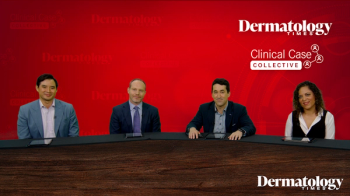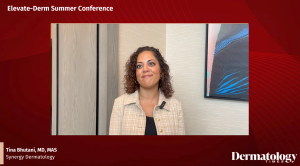
Tina Bhutani, MD, shares vital insights on psoriasis management, sleep's role in dermatology, and new alopecia areata treatments at Elevate-Derm Summer 2025.

Tina Bhutani, MD, shares vital insights on psoriasis management, sleep's role in dermatology, and new alopecia areata treatments at Elevate-Derm Summer 2025.

Panelists discuss how the future of generalized pustular psoriasis (GPP) diagnosis and management looks promising with emerging genetic testing for IL36RN mutations, development of multiple targeted biologics beyond IL-36 inhibitors, potential personalized treatment algorithms, improved disease classification, and enhanced multidisciplinary care approaches to better address this rare but severe dermatological condition.

Panelists discuss how a high-risk patient with generalized pustular psoriasis requires a carefully tailored treatment approach that balances aggressive intervention to control acute flares with consideration of comorbidities, medication interactions, and long-term safety concerns, often necessitating multidisciplinary collaboration between dermatologists, intensivists, and other specialists.

Panelists discuss how poorly managed generalized pustular psoriasis (GPP) flares can lead to recurrent hospitalizations and significant morbidity, while reviewing Effisayil 2 trial results that demonstrated the effectiveness of maintenance therapy in preventing flares and sustaining long-term disease control through targeted inhibition of the IL-36 pathway.

Panelists discuss how a generalized pustular psoriasis (GPP) emergency case highlights the rapid onset, systemic complications, and treatment challenges of this condition, while reviewing Effisayil 1 trial results that demonstrated spesolimab’s efficacy in quickly resolving pustulation through IL-36 pathway inhibition, representing a significant advancement in targeted therapy for acute flares.

Panelists discuss how prior and current treatments for patients with generalized pustular psoriasis (GPP) have evolved from traditional systemic therapies with significant limitations to newer targeted biologics and small molecules that specifically address the underlying IL-36 pathway dysregulation, offering improved efficacy and safety profiles for this rare but severe condition.

Panelists discuss how recognizing the flares and triggers of generalized pustular psoriasis requires vigilant monitoring for warning signs such as fever, malaise, and spreading erythema, while understanding that common precipitating factors include medication withdrawals, infections, pregnancy, and certain drugs that can rapidly transform stable disease into acute, potentially life-threatening episodes requiring immediate intervention.

Panelists discuss how generalized pustular psoriasis (GPP) profoundly impacts patients’ quality of life through physical pain, psychological distress, social isolation, and functional limitations, necessitating comprehensive support systems that address both medical management and psychosocial well-being.

Panelists discuss how the diagnosis and management of generalized pustular psoriasis present significant challenges due to its rarity, complex presentation, potentially life-threatening complications, limited treatment options, and the need for multidisciplinary care approaches.

Panelists discuss how clinical experience in diagnosing generalized pustular psoriasis (GPP) requires recognizing its hallmark features of widespread sterile pustules on inflamed skin, distinguishing it from other pustular conditions, and understanding the genetic mutations and triggers that can precipitate this rare but potentially life-threatening form of psoriasis.

Panelists discuss how generalized pustular psoriasis (GPP), while rare, presents with distinctive widespread sterile pustules on erythematous skin, requires prompt medical intervention, and differs significantly from more common plaque psoriasis in its clinical presentation, triggers, and treatment approaches.

Published: July 27th 2025 | Updated:

Published: March 25th 2025 | Updated:

Published: April 1st 2025 | Updated:

Published: March 25th 2025 | Updated: